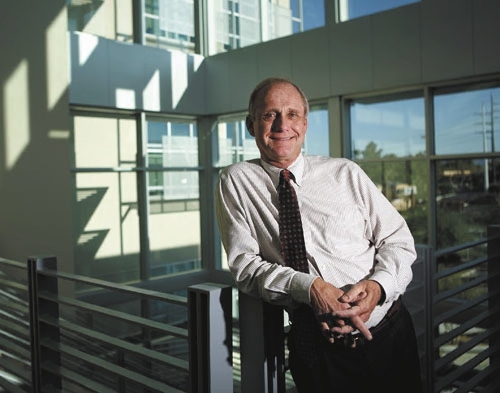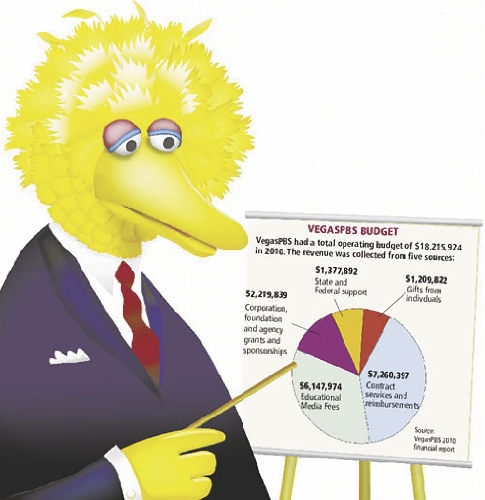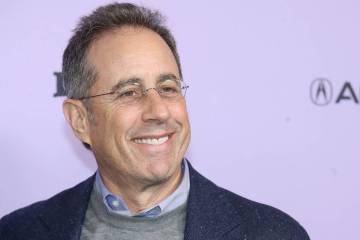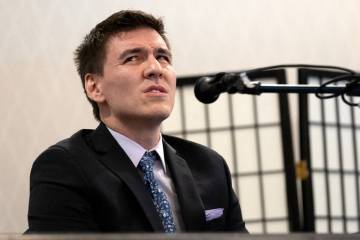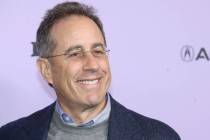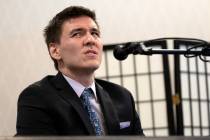Business savvy lets VegasPBS grow, deliver popular programs
There's big money in Big Bird.
VegasPBS, the region's public broadcasting powerhouse associated with the Clark County School District, has grown into an $18 million-a-year diversified business, with nearly $63 million in net assets, up from $17 million in 2008.
It's not that being a PBS affiliate has suddenly become a gateway to riches. The nonprofit station has diversified its business to include an online virtual high school, online courses for teachers and unemployed workers and certified professional careers.
The station has also benefited financially from the never-ending War on Terror, landing Department of Homeland Security grants to build a regional emergency response support system.
While VegasPBS still relies on more traditional grants and donations made during pledge drives to help keep the station on the air, its diversification strategy is paying dividends.
"We have weathered the recession pretty well," said Tom Axtell, general manager of KLVX-TV, Channel 10, which is branded as VegasPBS.
Operating revenue was $18.21 million in 2010. Operating expenses were $11.43 million, with the resulting surplus allowing the station to repay $6.38 million of the $18.1 million it borrowed from the school district to build its $70 million headquarters on East Flamingo Road in 2010. The final $1.5 million loan payment to the school district should be made by the end of fiscal 2012, he said. The majority of the construction was financed through a $40 million capital campaign before work began.
Axtell said the increase in the station's assets is a direct result of capabilities that came with that new 112,000-square-foot building.
FOCUS ON EDUCATION
As television came into vogue in the 1940s, Congress reserved some broadcast frequencies for educational purposes, many of them licensed to colleges and large school districts that operated radio stations. In 1953, the University of Houston signed on the nation's first noncommercial educational TV station.
Public television received a big boost through the Public Broadcasting Act of 1967, which authorizes federal funding for PBS stations. About five months later, on March 25, 1968, CCSD powered up Nevada's first public television station.
Sesame Street, with its well-recognized Big Bird and other lovable Muppets, debuted in 1969, helping popularize the Public Broadcasting Service.
For much of its life, public broadcasting has relied on a mix of local and federal taxpayer support, program underwriting by foundations and corporations, and small donations from viewers, often during on-air fund drives.
While VegasPBS thrives, independent public television stations are an endangered species in some places. According to the Corporation for Public Broadcasting, which distributed $446 million in federal support to about 1,300 public radio and TV stations in fiscal 2012, funding for public television has dropped by about $120 million over the last two years alone. Several stations have gone dark or sold out to other operators.
Concern for public broadcasting's future has prompted formation of a new nonprofit, Independent Public Media, to help foundering stations.
"Public television remains a vital information source that finds itself in the same evolutionary process as print journalism," said John Schwartz, president of EBS Cos., which founded IPM. "Old financing models no longer work; a new model must emerge if public television is to survive."
VegasPBS may have found just that new business model.
NEW REVENUE STREAMS
While maintaining and even expanding its traditional educational mission, VegasPBS has branched out in ways unusual for PBS stations.
VegasPBS has become a hub for college-level Advanced Placement classes for high school students, particularly those in schools in which low enrollment can't justify an on-site instructor. Instead, a digital feed allows a single CCSD teacher at the station to interact with students at multiple schools.
While programs for the school district are produced at cost, other organizations that use the same model for a variety of training programs pay a small fee, producing income for the station.
Axtell said that when Las Vegas' economy tanked in early 2007, VegasPBS executives wanted to help. Using its digital broadcast technology, the station began producing and distributing teacher training and certification courses statewide. The lineup now includes other certificate programs, such as a pharmacy technician course involving 13 weeks of training at a CVS or Walgreens.
"We have hundreds of courses for those looking for a job," Axtell said. "We match your existing skill set, so you are able to get a job."
Most courses are low cost or no cost to the trainee. VegasPBS, which spent $2.37 million on the program last year, is paid $300 to $2,000 per course by the state.
VegasPBS sees job training as a growth industry.
"Our target is 4,000 students taking advantage of the voucher program,'' Axtell said. "We have between 800 and 900 for this year."
The switch from analog to digital broadcasting allowed VegasPBS to expand its programming over additional channels: Create, which features how-to shows; V-Me, with Spanish-language programs; two children's channels, Jackpot and Sprout; and two news and entertainment channels, Worldview and Rewind.
Meanwhile, the station leveraged that digital reach with Homeland Security backing. It now maintains a digital database of building blueprints for use by police and fire departments, and is digitizing maps and public agency contact lists for use during emergencies.
"We are able to stream digital data over an emergency (channel)," Axtell said. "Currently, there are 80 police cars equipped with computers where the information shows up on their laptop."
He said he wants to "dramatically expand" the program in coming months.
"Digital allows you to expand your offerings and change the mindset of what a public station can offer," Axtell said. "That's what we are trying to do."
In 2010, state and federal support for VegasPBS, including emergency preparedness, totaled $1.37 million.
NEW PROGRAMMING THAT PAYS
Axtell said the station may launch its own nightly newscast in the future.
"We are worried about shrinking newspaper staffs and the demise of television news," he said. "We are looking at what stations in San Diego and San Francisco are doing."
KPBS in San Diego offers "Envision San Diego," a half-hour nightly report focusing on specific issues such as whooping-cough concerns and the Arizona immigration law's effect on Southern California.
"We won't cover car chases or celebrities," he said. "We'll talk about water and other issues that have a public policy appeal. It's a niche audience."
Axtell believes there's a demand for quality local news programs in Las Vegas, and that there's a clientele that will pay for it through corporate underwriting, grants and member donations.
VegasPBS has expanded its local program production since it moved to its new building. During the 2011 legislative session, the station co-produced a public affairs program, "Inside Nevada," with the Las Vegas Review-Journal and KLAS-TV, Channel 8.
But the station is also the home of "Hubert Keller: Secrets of a Chef," which had no ties to Las Vegas before setting up shop at VegasPBS.
"The production capabilities of the new building have stimulated interest from many potential partners," Axtell said. "Marjorie Poore Productions moved their company from California to Las Vegas to produce season three of 'Hubert Keller: Secrets of a Chef.' "
Axtell said landing Keller's show has meant "new jobs, industrial diversification and tax revenue" for Las Vegas.
Renting VegasPBS' facilities and technical staff to clients as diverse as Nancy Grace and The Community Coalition for Oral Health provides one more revenue stream for VegasPBS.
"Vegas PBS is the destination for all your professional video production needs,'' the station promises on its website. "Vegas PBS assists clients with productions from initial concept to completion. Our friendly, experienced, crew is comprised of Emmy Award-winning producers and editors. When you choose Vegas PBS you gain access to our well-equipped studios, which have served as movie sets and hosted legends such as Frank Sinatra, television personalities, like Geraldo Rivera, and numerous officials from various levels of government.''
BUSINESS COMPETITIONS?
Those moneymaking efforts by a nonprofit organization might be seen as competition to commercial interests, but VegasPBS has met little opposition.
"I wouldn't say anything to hurt them," said Jim Rogers, owner of Intermountain West Communications Co., which operates 16 television affiliates in five states, including KSNV-TV, Channel 3 in Las Vegas. "If they are out there to sell a service and people want it, that's fine with me."
Rogers, a longtime Las Vegas civic leader, said that if something VegasPBS did affected his business, he would blame only himself.
"I have always supported them," Rogers said. "I think Barbara (my wife) and I gave them $5,000 this year."
While entrepreneurial efforts have helped boost VegasPBS' bottom line, donations from civic-minded individuals and corporations are still critical for balancing the books.
In 2010, the station raised $1.2 million from its members, up from $1.1 million in 2009. Underwriting, corporation and foundation grants declined by $120,785 last year, to $794,809, compared with $915,594 in 2009.
"When the economy rebounds, we expect corporate donations to rebound," Axtell said.
One of its most supportive corporate partners has been Bank of America.
"VegasPBS is a genuine community asset that provides unbiased news, entertainment and education programs that inform us all, regardless of our views or ZIP codes," said George Smith, president of Bank of America Nevada. "Its programming, online resources and forward-thinking approach enrich the greater Southern Nevada community,"
Smith said the bank has supported the station for more than 10 years but declined to say how much it has donated.
And what about the educational mission that is the core of the VegasPBS business model?
The station's most successful local show is one most people have never heard of: "Homework Hotline."
Students call in from 3:30 p.m. to 5:30 p.m. for help with math or writing assignments. CCSD teachers answer on the air from 4 p.m. to 5 p.m.
"We get about 12,000 calls a year," Axtell said.
Add to that Big Bird, "Masterpiece Mystery," "Antiques Roadshow" and even "Australian Rules Football," and VegasPBS is the "most viewed" public station in the U.S. with an average monthly audience of 446,743, according to Neilsen ratings for the 12 months ended Sept. 30.
Axtell sums up his operation's rapid growth in language that someone might expect more from a corporate executive ruminating on mergers and acquisitions than from the manager of a nonprofit education operation.
"Although we are growing locally and are admired by our colleagues in other cities,'' he said, "we wish our business model of diversified services and revenue streams from both broadcast and online services would be more widely duplicated in other cities."
Contact reporter Chris Sieroty at csieroty@reviewjournal.com or 702-477-3893.



